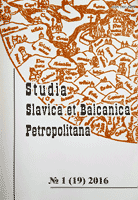АЛХИМИК, ЯНЫЧАР И «РОДИЧ ВИЗАНТИЙСКИХ ЦАРЕЙ»: ПАЛЕОЛОГИ В РОССИИ КОНЦА XVI – ПЕРВОЙ ПОЛОВИНЫ XVII ВЕКА
The Alchemist, the Janissaries and «relatives of the Byzantine Tsars»: Palaeologus in Russia in the late 16th – first half of the 17th century
Author(s): Tatyana Anatolyevna OparinaSubject(s): History, Modern Age, 16th Century, 17th Century
Published by: Издательство Исторического факультета СПбГУ
Keywords: Russian-Greek relations; Migration from the Ottoman Empire and its vassal states; genealogy; biography; foreigners in the Russian part of the privileged class
Summary/Abstract: Based for the first time introduced archival sources, this article examines the presence in Russia of immigrants, identify themselves as Palaeologus. Dynasty of the last Emperor of Byzantium was interrupted by the beginning of the 16th century and from that time began to appear numerous «descendants». They were considered the true heirs of the Imperial family by the Christian patriarchs of the East, rulers of Moldavia and Wallachia and Western Europe. Some of them moved to Russia, hoping to use the famous name to enter the privileged class. Russian authorities readily responded to similar requests for Russian citizenship. However, most Palaeologus did not reach a significant status in Russia. One Paleologus turned out to be an alchemist and was exiled to Kazan and his companion after 30 years in exile declared himself a direct descendant of Alexander the Great. Another Paleologus, a former Janissaries, couldn’t keep the corporation of Moscow nobility. The real success of the promotion in Russian society made other immigrants: Murzas. They and their descendants joined the ranks of the Russian nobility.
Journal: Петербургские славянские и балканские исследования
- Issue Year: 2016
- Issue No: 1 (19)
- Page Range: 131-158
- Page Count: 18
- Language: Russian

